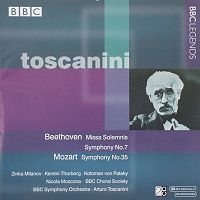
Trawling for treasure
BILL NEWMAN seeks out Golden Age performers now reinstated on CD
BBC BBCL 4016-2
|

|
Despite the pinnacles of excellence that Toscanini achieved during the
time he was in charge of the New York Philharmonic Symphony Orchestra, and
the lengthier period when he conducted the NBC Symphony, I have always regarded
the concerts with the BBC Symphony and choral forces -- from the evidence
of available recordings -- as more musically satisfying and epoch making.
Their significance on the musical scene, both yesterday and today, justifies
Sir Adrian Boult's stirling and conscientious efforts to prepare his
players up to the hilt for the great man's visits. Toscanini was to
make twenty in all, interrupted by the start of World War II -- but they
signified the maestro's high approval of Boult's knowledge and
expertise in the classical repertoire, immediately discernible in the disciplined
directness and full-toned clarity of the orchestra's live concerts
and recordings over the air or on disc.
Cherubini's Anacreon Overture, for the moment disregarding
Harvey Sach's opinion of the piece, was a Toscanini speciality: he
had conducted it ten years' earlier before this 1935 BBC performance
with the Le Scala Orchestra. The whole work is styled as an opéra-ballet,
and the overture progresses from a refined chamber start through arc-shaped
spans of legato lines to moments of drama, with pointed counter asides
in the style of opera buffa. The performance is a remarkable example
of the maestro's eloquent stick technique and ear for instrumental
balance. Strings possess that 'white' sounding, non-vibrato blend
which keep textures absolutely clear, while the tiny touches of Italian
portamenti give a foretaste of Rossini and Donizetti, who were shortly
to arrive on the scene. The influences on Haydn and Beethoven are obvious.
Mozart's Haffner Symphony, more contrastingly dramatic and
poetic in turn, finds Toscanini in his element, despite his minor distractions
of humming sections of the melody that denotes his love of the music [listen -- CD 1 track 3, 0:00-0:50]. I find no argument,
as some commentators do, with his Italianate smooth, unbroken shaping of
upper string phrases. There is a theatrical feel here in keeping with the
composer's works for the stage in the 1780s. Play Beecham or Klemperer
and you will hear different approaches to Mozart's genius, but
Toscanini's finely weighted, sonorous and beautifully compact reading
surges with vitality, capped by an effervescent, high-spirited Finale.
Beethoven 7 has more universal claims on our appreciation of great music
performed by various schools of conductors, where different opinions of
tempi apply. Sachs is right when he claims that Toscanini's style of
performance compares largely with his recordings with the New York Philharmonic
and NBC Symphony. Movement repeats are not made, although Boult was most
particular regarding this throughout his career, perhaps for the sake of
interrupting the discourse of flow and sudden key contrasts, but tensions
are maintained through emphasis of the bass line.
It is fascinating to compare Toscanini's tighter, fluid account
with Fritz Reiner's celebrated Chicago Symphony recording where, despite
a slightly weightier German approach, tempi and rhythmic nuance are
remarkably similar.
In Beethoven's Missa Solemnis extra special considerations
apply, and when one listens to a cross section of the internationally famous
beside Toscanini, Böhm, Jochum, Karajan, Sawallisch, Giulini, Mitropoulos,
Kleiber, Beecham, Szell, 'live' the work's fearsome musical
and technical demands, and what are called Beethoven's 'miscalculations'
or 'idiosyncrasies' in the score, they call for challenging differences
of approach and a separate tally of resulting standards. I have never taken
to Toscanini's later RCA recording or, indeed, the 1940 live NBC transmission.
Non-sympathetic sound has an unfortunate way of distorting the image of
music scored for larger forces, and some of his ruthless downbeats and clipped
ending of phrases I consider unmusical, although battling with a dry acoustic,
minus reverberation poses considerable problems.
No such problems existed at Queen's Hall, London, on 28 May 1939
when this BBC performance and recording took place shortly before war was
declared. The breadth and charisma of Toscanini's performance, together
with his dedicated attention to phrasing and dynamics (and I note Sach's
tempo comparisons to the 1940/53 readings) give added humanity and
spiritual endeavour to how the music should sound.
Detailed analysis is not called for, but individual choice of tempi
is admirable. The excellent team of soloists -- Zinka Milanov (over
impetuous in places), Kirsten Thorborg, Koloman von Pataky, and Nicola Moscano
-- blend skilfully with the chorus and orchestra, all ready to follow the
maestro's demands. Paul Beard's wonderfully sustained solo in
the Sanctus, too, must be one of the highspots in his long
and illustrious career [listen -- CD2, track 3, 1:00-2:22].
After I had played the Kyrie at a Gramophone Society meeting,
a member expressed his extreme pleasure and marvelling at the sound quality
for this historic event over sixty years ago.
Continue >>
Copyright © 23 May 2001
Bill Newman, Edgware, UK
 CD INFORMATION - BBC LEGENDS BBCL 4016-2
PURCHASE THIS DISC FROM CROTCHET
PURCHASE THIS DISC FROM AMAZON
<< Music
& Vision home Recent reviews
Michelangeli >>
Record Box is Music & Vision's regular Wednesday series
of shorter CD reviews
CD INFORMATION - BBC LEGENDS BBCL 4016-2
PURCHASE THIS DISC FROM CROTCHET
PURCHASE THIS DISC FROM AMAZON
<< Music
& Vision home Recent reviews
Michelangeli >>
Record Box is Music & Vision's regular Wednesday series
of shorter CD reviews
|

